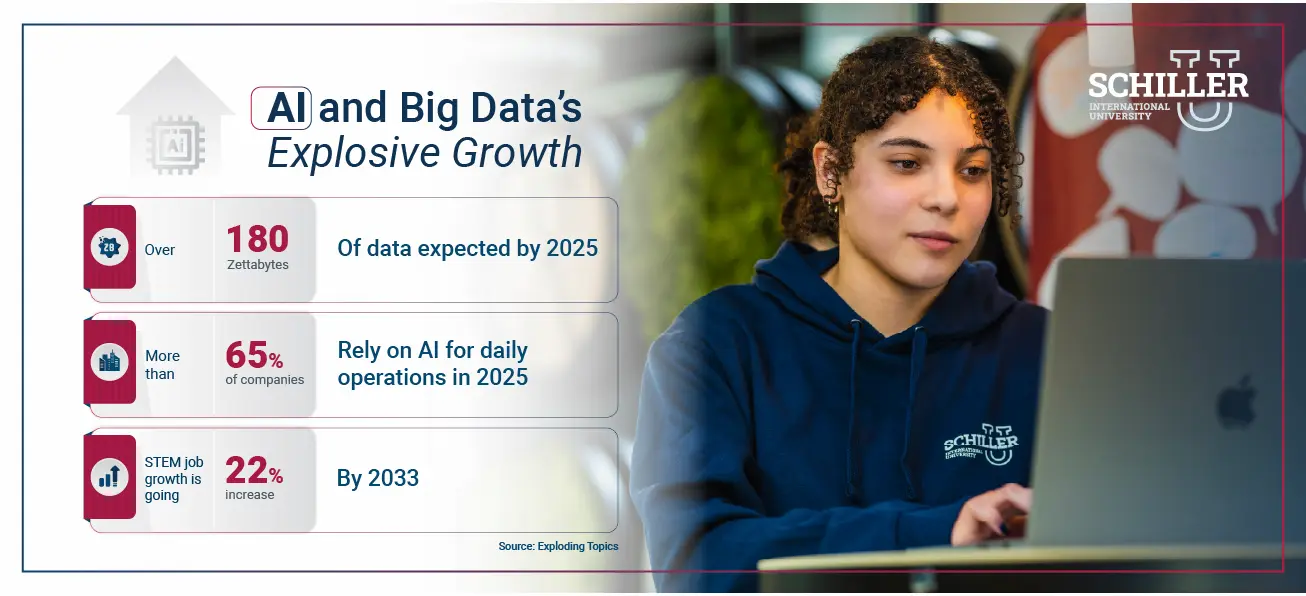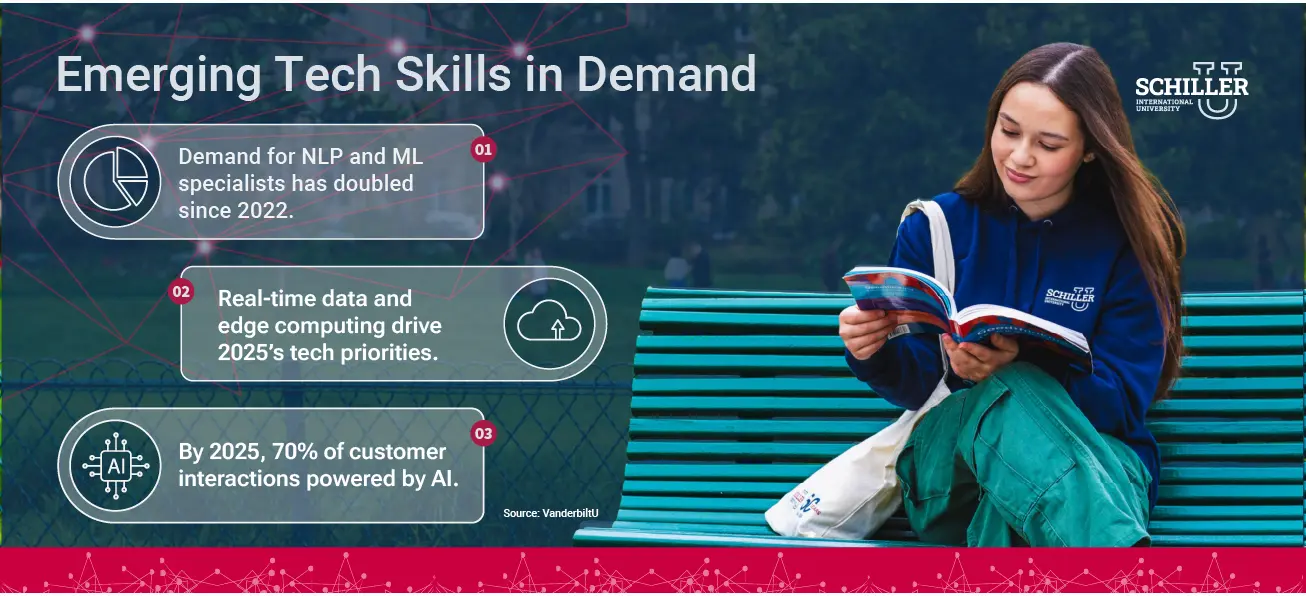Artificial intelligence (AI) and big data dominate the technology scene, pulling strings in everything from apps to business moves. They’re shaping how we order coffee, get medical advice, and protect our identities. Imagine machines chatting like friends or processing mountains of data instantly. AI mimics smarts, learning from patterns to predict outcomes. Big data handles huge info piles, turning chaos into gold. Together, they fuel breakthroughs in health checks and traffic flows.
Why care now?
If you’re aiming for a future in computer science, you should pay close attention: both fields fuel massive shifts in everything from healthcare to finance to entertainment. They run the real-world engines behind self-driving cars, instant translations, and smart homes. This kind of transformation isn’t future talk; it’s happening every time you greet your phone’s voice assistant or see tailored movie picks in your streaming queue. AI and big data are redefining tech careers and shaping tomorrow’s skills.
Growing Importance of AI and Big Data in Computer Science

AI and big data are the twin engines of modern tech progress. AI refers to machines learning to solve problems, make decisions, or even hold basic conversations.
Big data feeds AI for better guesses. It's like giving your brains endless books to read. Big data describes the tidal wave of information—global data creation is set to reach 180 zettabytes by 2025—that fuels AI engines.
As per the Stanford AI Index 2025, 78% of organizations use AI, up from 55%. Key technological trends in computer science mean learning to process data on-the-fly, crunch numbers, and harness information never imagined even a decade ago.
Role and Impact:
| Element | Role | Impact |
| AI | Learns patterns | Faster decisions |
| Big Data | Stores volumes | Deeper insights |
| Analytics | Processes | Actionable results |
Key AI Trends Every Computer Science Student Should Know
Natural Language Processing (NLP) lets bots understand language. Neural networks mimic brains for learning. Deep learning handles layers of data. AI driven personalization tailors experiences. Chatbots like Siri use NLP for replies. Advances in deep learning speed up image spots. Automation zips through complex tasks. Students grasp these for edge in projects.
Following are the Top Key AI trends:
Natural Language Processing and Conversational AI
NLP is how your voice assistant 'gets' you. Tools like ChatGPT and Alexa use it to interpret and respond with increasingly human-like fluency. Companies crave these skills—demand for NLP experts has doubled since 2022.
Neural Networks and Deep Learning
Deep learning powers facial recognition, medical imaging, and next-level video recommendations. Knowing your way around neural networks (the architecture behind deep learning) is a strong move for tech students.
AI-Driven Automation and Personalization
AI speeds up complicated tasks—think autopilots, fraud detection, or personalized playlists—and saves companies big money. By 2025, 70% of customer interactions are predicted to involve some AI element.
Core Skills
- Data analysis with Python or R
- Machine learning model building
- Real-time problem-solving
Hot Technology and What’s New
| 2025 Hot Technology | What’s New |
| Edge Computing | Local analysis, lower lag |
| Data Privacy Legislation | General Data Protection Regulation (GDPR), California Consumer Privacy Act (CCPA) expand globally |
| Cloud Integration | Multi-cloud, seamless scale |
Big Data Trends in Technology
Real-time data processing catches trends live. Edge computing moves smarts closer to sources. Cloud platforms scale storage easily. Privacy rules like GDPR guard information. Tools evolve faster for handles. McKinsey notes agentic AI as hot in 2025. Ethics ensures fair use. Security blocks breaches.
Big Data Trends Breakdown
- Real-Time Processing: Edge computing crunches data faster at the 'edge', not just in cloud warehouses.
- Cloud-Based Tools: Platforms like Amazon Web Services (AWS), Google Cloud, and Azure now handle most big data workloads.
- Data Privacy and Ethics: With more data comes more responsibility. New rules and technology help limit misuse.
- Big Data Tools and Techniques: From Tableau to Hadoop, hands-on knowledge trumps theory.
Intersection of AI and Big Data
AI amplifies big data tools and techniques with auto sorts. AI driven models predict futures. Health apps spot diseases early. Finance catches fraud via patterns. Cybersecurity blocks threats. Smart cities optimize flows. AI and data science merge for power. Analyzing data yields forecasts. Complex tasks like genome maps speed up.
AI and Big Data Transform Industries
AI unlocks insights from big data that no human analyst could spot alone.
| Healthcare | Finance | Cybersecurity | Smart Cities |
| Predict patient risks, spot patterns, and power smart diagnostics. | Rapid fraud detection and investment insights. | Real-time attack detection, auto update defensive measures. | Control traffic, energy, and even pollution levels with automated intelligence. |
Skills Computer Science Students Need for the AI and Big Data Era

Bureau of Labor Statistics projects 23% growth in AI jobs by 2032.
Top Skills at a Glance
- Programming Languages: Python, R, Java—essentials for handling data and machine learning.
- Data Analytics: Know how to pull, clean, and crunch large datasets.
- Machine Learning Basics: Understand core machine learning (ML) concepts—even if you’re not a data scientist yet.
- Soft Skills: Adaptability, communication, ethical awareness.
Career Opportunities in AI and Big Data
Research pushes AI frontiers. Data roles crunch numbers. Specialties like NLP engineers or ethics professionals will emerge. The demand is global, with a median pay of $145K for researchers (ComputerScience.org).
AI and big data career opportunities span sectors
| Research innovates | Engineering builds |
| Ethics consults | Global jobs grow |
Hot Career Opportunities
| AI Researcher | Data Engineer/Analyst | NLP Engineer | Cybersecurity Specialist |
| Solve practical problems with smart algorithms. | Build, maintain, and interpret big datasets. | Focus on speech and text; high-growth track. | Keep systems safe using AI-powered monitoring. |
Key Updates:
AI and big data graduates enjoy strong demand. In the US, machine learning engineers average $118,350 annually; cybersecurity roles can hit $120,000+.
AI and big data career opportunities are rising fast, with a 23% growth forecast for research scientists from 2022 to 2032.
(Source: Founders Forum)
How Schiller International University Prepares Students for the Future
Schiller's setup dives into AI and big data via its BSc in Computer Science program that arms you with technical smarts and global savvy across the USA (Tampa), Spain, France, and Germany campuses.
You will be prepared for:
- Future-Focused Pillars: Training in Data & AI, Leadership, Sustainability, and Entrepreneurship.
- Hands-On Training: Work on machine learning, cybersecurity, and data analysis projects using real-world platforms: Python, SQL, Jupyter, Power BI, and Tableau.
- Hackathons and Real Projects: Build innovative solutions in team environments and engage in industry-connected challenges.
- Global Exposure: Switch campuses, collaborate internationally, and boost your cultural and professional network—all while developing a 360º tech profile for the modern job market.
Gear Up for the AI and Big Data Wave
AI and big data aren’t just trends, they’re your toolkit for tomorrow’s big opportunities—whether you build smarter apps, secure critical data, or innovate in a global business setting. Staying up to speed gives you an unmistakable edge and opens doors anywhere tech matters (which is just about everywhere).
Want a future-proofed career, hands-on experience, and a ticket to an international technology playground?
Consider the BSc in Computer Science at Schiller International University—maybe your 'Apply Now' moment is one click away.
FAQs
Q1: What are the most important AI trends computer science students should follow?
Answer: Watch generative models, ethical frameworks, and quantum boosts for game-changing apps in everyday tools.
Q2: How is big data transforming computer science careers?
Answer: It opens roles in analytics and engineering, demanding skills in handling large amounts of data for business applications.
Q3: What skills do computer science students need to succeed in AI and big data?
Answer: Master languages like Python, grasp ML basics, and hone problem-solving for real-world technology fixes.
Q4: Why is understanding AI and big data important for future technology professionals?
Answer: They drive innovation, job growth, and solutions to big problems, keeping pros relevant in shifts.
Q5: What career paths are available in AI and big data for computer science graduates?
Answer: Options include data scientists, ML engineers, and ethics advisors in health, finance, and more.

 Request information
Request information









